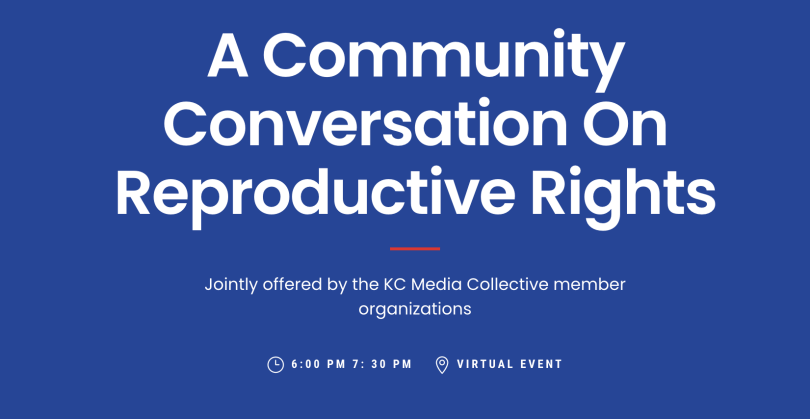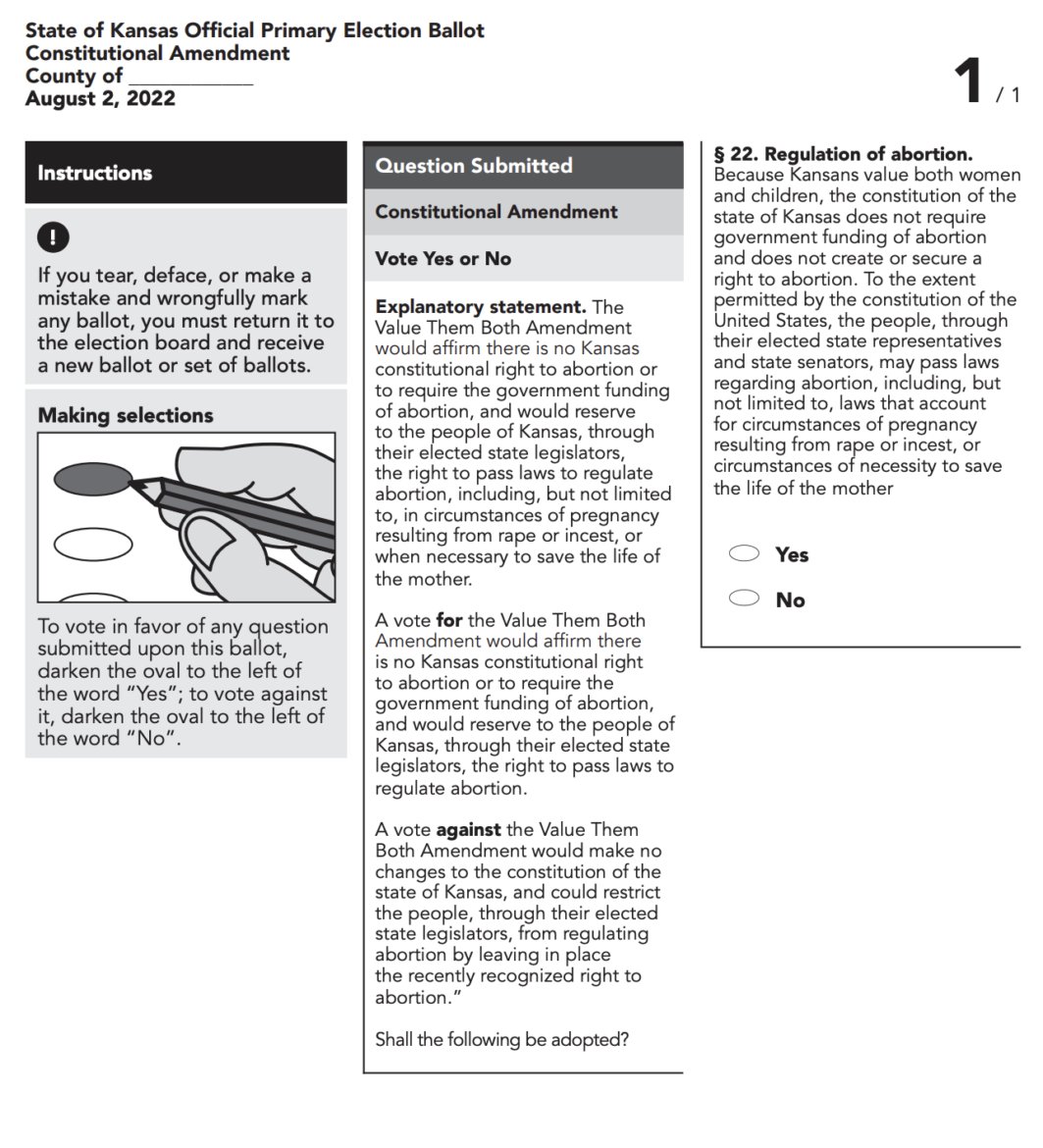curiousKC | A Guide to What You’ll See in the Aug. 2 Kansas Primary About Abortion The ballot language can be confusing, so we broke it down for you
Published July 25th, 2022 at 3:40 PM
The primary election is near for Kansans, with critical issues set to be voted on Aug. 2.
Several key votes are on the ballot but one, in particular, has gripped headlines: abortion rights and access.
In 2019, the Kansas Supreme Court ruled that abortion access is a constitutional right and therefore it will “protect a woman’s right to decide whether to continue a pregnancy,” according to court files.
This aligns with global health leaders’ stance on the issue. Worldwide, comprehensive abortion care is on the World Health Organizations List of essential health care services. Comprehensive abortion care includes, but is not limited to, educational resources, pre- and post-abortion care, as well as miscarriage care.
With Roe v. Wade overturned, now it’s up to each state to determine the legalities of abortion access and care. “Lack of access to safe, timely, affordable and respectful abortion care is a critical public health and human rights issue,” according to WHO.
An amendment called “Value Them Both” would change that.
Voters will decide on a provision that would deem the state’s constitution does not protect abortion rights. Critics and abortion-rights advocates say if “Value Them Both” is approved, that would be the first step toward stricter regulations on abortion access. Legal experts say approving the amendment could lead to a full ban.
Here’s what you need to know before you head to the polls or mail in your vote.
KC Media Collective partner KCUR provides a thorough breakdown of how to vote and what candidates are on the ballot for the state office seats.
Key dates for the upcoming election according to KCUR:
- In-person advance voting ends: Aug. 1
- Deadline for mailed ballot to be postmarked: Aug. 2
- Primary election: Aug. 2, 2022
- Last day for mailed ballots to reach the election office and still be counted: Aug. 5 at 5 p.m.
What does the “Value Them Both” amendment ballot look like?
Here’s what to expect to see. Tip: We’ll break down the language in the next few sections.
What does it mean?
The “Value Them Both” amendment wants to change the Kansas Constitution’s protections around abortion. The provision itself does not ban abortion. However, it would allow the legislature to restrict abortion access.
The amendment, which you can read in full here, states that “the Kansas Constitution does not require government funding of abortion and does not create or secure a right to abortion.”
Amendment supporters claim the current law “restricts the people” from regulating abortion. Reproductive rights, legal and health experts have said that’s not true.
Read Flatland’s coverage of the impending ballot referendum and what that means for Kansas here.
Flatland on Kansas City PBS
Defining “abortion protections.”
As defined by the Center for Reproductive Justice, abortion protections are broken down into two types.
Statutory protections for abortions are laws “passed by states that protect the right to abortion.” Kansas’ current constitutional protection affirms that its bill of rights “protects the right to abortion, separately and apart from the existence of any federal constitutional right.”
If I vote “yes” what does that mean?
A “yes” vote means you support removing abortion protections from the Kansas Constitution.
If I vote “no” what does that mean?
A “no” vote means you want to keep the existing constitutional protections to abortion access.
How will this affect reproductive health care access?
The answer depends on who is voted in or out of the state legislature.
However, it could have an effect on community reproductive health clinics, physicians and providers who provide services to people wanting or needing abortion care, as well as legal scholars and firms that specialize in reproductive rights and justice.
This Kansas News Service brief outlines a few key points, some of which are:
- Kansas Supreme Court’s 2019 ruling, which dictates state protections, is the only “shield for abortion rights in the state,” Kansas News Service reporter Dylan Lysen wrote.
- In 2021, Kansas saw an increase of visitors from other states with restrictive abortion laws, such as Texas and Oklahoma.
- Should the constitutional amendment be approved, Republican legislators will likely introduce a cascade of new restrictions. They would likely follow neighboring states example to limit abortion access, such as Texas for example.
What are the current abortion restrictions in Kansas?
As of June 26, 2022, nine restrictions on abortion were in effect, according to The Guttmacher Institute:
“A patient must receive state-directed counseling that includes information designed to discourage her from having an abortion, and then wait 24 hours before the procedure is provided.
- Private insurance policies cover abortion only in cases of life endangerment, unless individuals purchase an optional rider at an additional cost.
- Health plans offered in the state’s health exchange under the Affordable Care Act can only cover abortion in cases of life endangerment.
- Abortion is covered in insurance policies for public employees only in cases of life endangerment.
- The use of telemedicine to administer medication abortion is prohibited.
- The parents of a minor must consent before an abortion is provided.
- Public funding is available for abortion only in cases of life endangerment, rape or incest.
- A patient must undergo an ultrasound before obtaining an abortion; the provider must offer the patient the option to view the image.
- An abortion may be performed at 20 or more weeks postfertilization (22 weeks after the last menstrual period) only in cases of life or severely compromised physical health. This law is based on the assertion, which is inconsistent with scientific evidence and has been rejected by the medical community, that a fetus can feel pain at that point in pregnancy.
- The state prohibits abortions performed for the purpose of sex selection.”
NEXT UP: REPRODUCTIVE RIGHTS AND RESOURCE GUIDE – COMING AUG. 1
Vicky Diaz-Camacho covers community affairs for Kansas City PBS. Cami Koons covers rural affairs for Kansas City PBS in cooperation with Report for America. The work of our Report for America corps members is made possible, in part, through the generous support of the Ewing Marion Kauffman Foundation.






